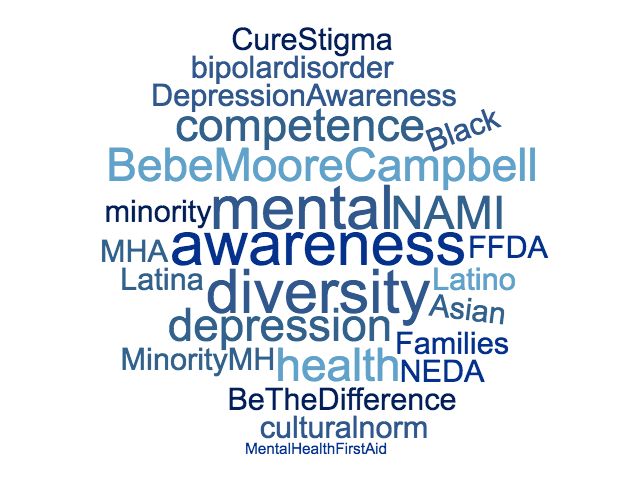
Care for Your Mind
Care for Your Mind is extending its coverage of National Minority Mental Health Awareness Month (NMMHAM) into August, recognizing that the issues of stigma and access to care aren’t limited to July. Read about how mental health organizations have been contributing to NMMHAM this year.
National Alliance on Mental Illness (NAMI)
“We need a national campaign to destigmatize mental illness, especially one targeted toward African Americans… It’s not shameful to have a mental illness. Get treatment. Recovery is possible.”
–Bebe Moore Campbell, 2005
It’s thanks to people affiliated with NAMI that we have National Minority Mental Health Awareness Month. Bebe Moore Campbell was an author, advocate for mental health education among diverse communities, and co-founder of NAMI Urban Los Angeles. After her death, the U.S. House of Representatives adopted a resolution in 2008 designating July as Bebe Moore Campbell National Minority Mental Health Awareness Month. The resolution aimed to highlight the need to improve access to mental health treatment, promote public awareness of mental illness, and especially enhance public awareness of mental illness among minority populations.
This year, NAMI reminds us that some communities face higher barriers than others in securing mental health treatment. Many people have poor access to care, grapple with cultural stigma, and receive low-quality care. NAMI is supporting the NMMHAM with its three-part docuseries, “Strength Over Silence: Stories of Courage, Culture and Community,” which examines African-American and Latino perspectives on mental health.
NAMI also continues its CureStigma campaign, that the virus spreading across America is stigma. The good news: stigma is 100% curable. Check out the NAMI webpage.
Mental Health America (MHA)
This year’s campaign is #MyStoryMyWay. Last year, MHA learned that people don’t talk about issues of mental health in most communities, or that they do but don’t do so directly. A person’s culture influences the way that they talk – or don’t talk – about mental health, and we have different cultural norms so we don’t always hear what others are saying. MHA wants to learn from different communities about how they relate to and talk about mental health issues. Check out their Toolkit!
Families for Depression Awareness (FFDA)
Families for Depression Awareness recognizes that the majority of its audience is white and has committed to involving more communities of color. FFDA’s new brochure on adult bipolar disorder reflects the diversity of individuals and families affected by bipolar disorder. Read about FFDA’s strategies and list of minority mental health resources.
Mental Health First Aid USA (MHFA)
Mental Health First Aid, overseen by the National Council for Behavioral Health and the Missouri Department of Mental Health, shares some stark facts about minority mental health and points out that
[l]ack of culturally competent care has the potential to result in worse outcomes than [for] those who do not seek help in the first place. Not only do we need to ensure people of color receive adequate mental health care, we also need to ensure that trained health professionals are culturally equipped, empathetic, non-judgmental and able to understand, relate and properly diagnose each patient who walks into their office.
MHFA urges people from all communities to #BeTheDifference by taking a Mental Health First Aid course and being prepared to provide support to others.
National Eating Disorders Association (NEDA)
Check out NEDA’s blog, which compiles several posts from people of minority communities that reveal their experiences with mental health issues. Intern Claudia Morris explains to white people, “It’s necessary to hear their stories in order to gain a deeper understanding of their struggles and become a stronger ally.”
What do you think?
- What observances for National Minority Mental Health Month did you participate in or had you noticed? What kinds of recognition would you want to see next year?








Connect With Us